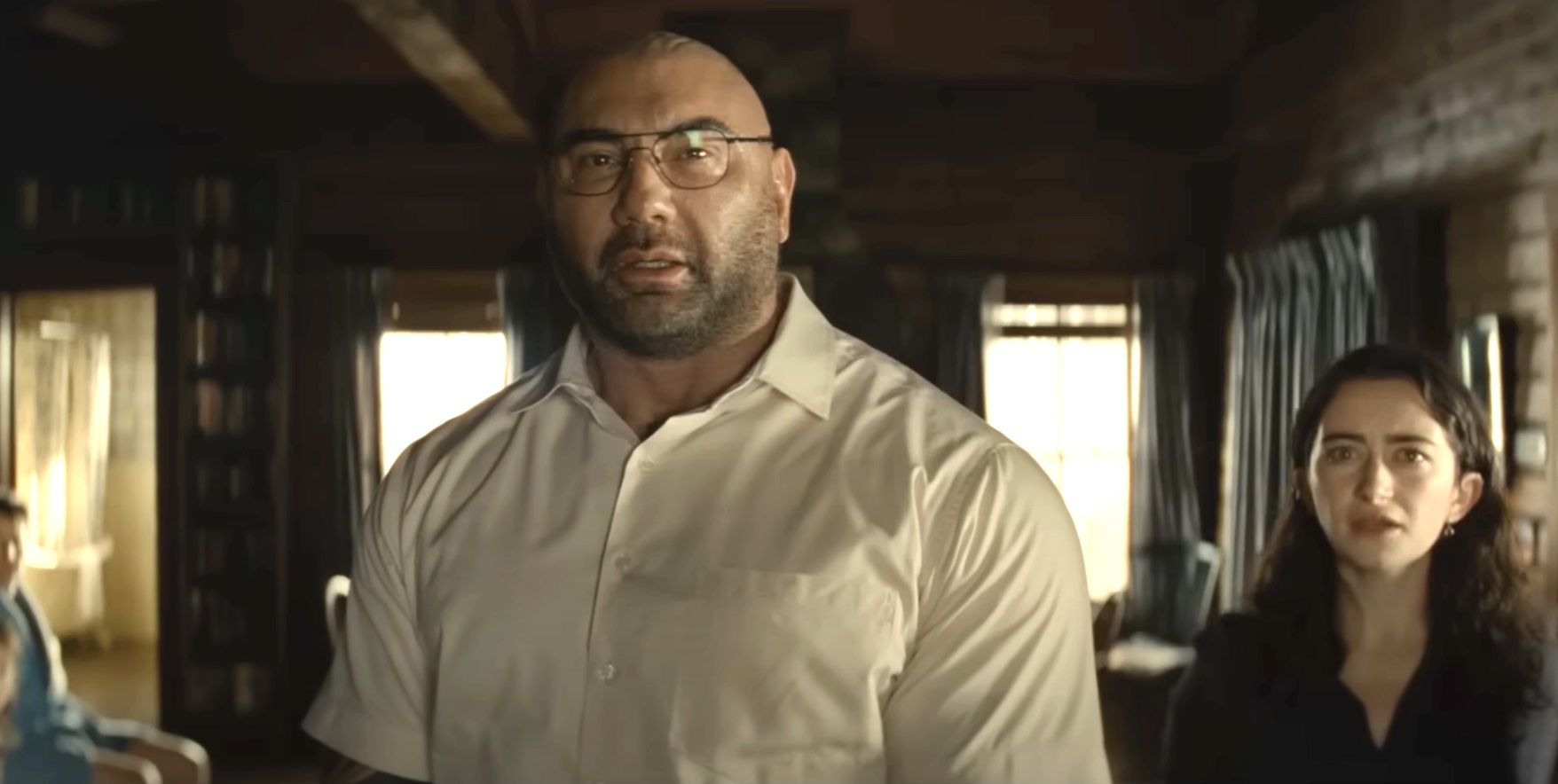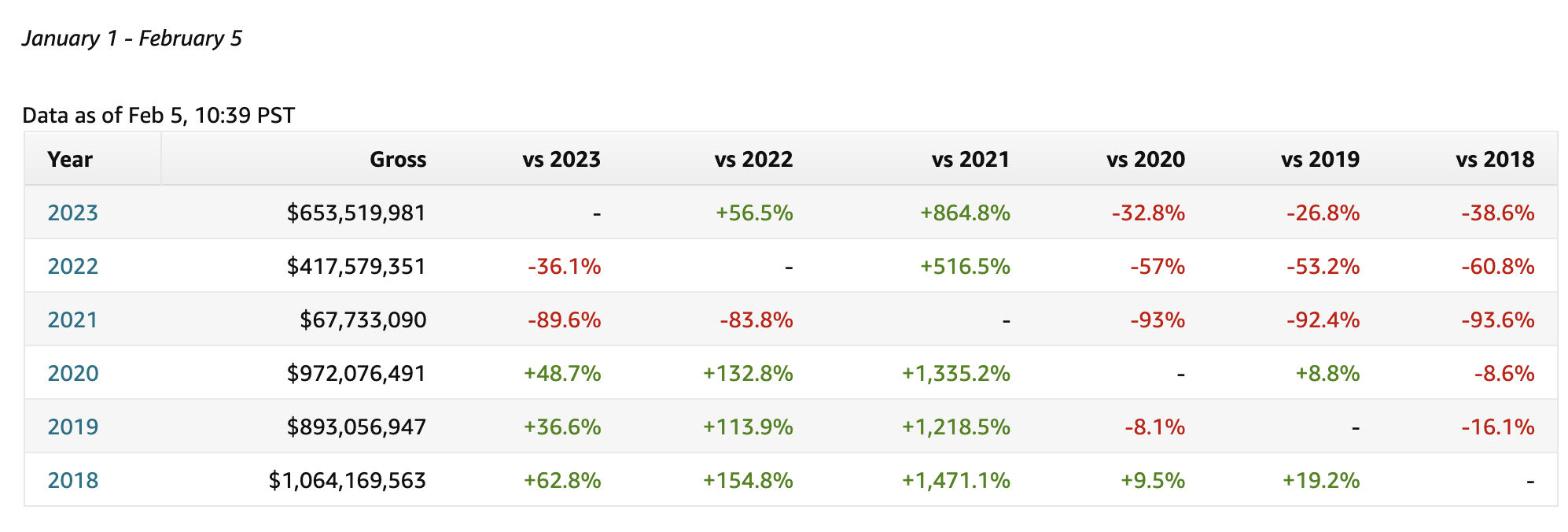Why 'Knock at the Cabin' Signals the Box Office Apocalypse
Compare what M. Night Shyamalan's latest domestic box office champ just did to how another one of his films, 'Glass,' opened just four years ago, and you'll understand what we mean

The smarter way to stay on top of the streaming and OTT industry. Sign up below.
You are now subscribed
Your newsletter sign-up was successful
Just as we're seeing in broadcast television, the traditional movie and TV economic horse races are still run, but the vastly shrunken scale of the metrics involved is truly shocking to the average industry watcher.
Take this weekend's domestic box office race.
Filmmaker M. Night Shyamalan's latest horror film, Knock at the Cabin, knocked James Cameron's Avatar: The Way of Water off its seven-week perch as the No. 1 film at the domestic box office ... by generating a bafflingly small $14.2 million in total three-day ticket sales.
Consider that just four years ago, before the pandemic, another one of Shyamalan's tense psychological thrillers released in approximately the same January/February frame, Glass, had markedly worse reviews from critics but still opened at $40.3 million in the U.S. and Canada.
In July 2021, with many theaters still shuttered amid the Delta surge portion of COVID, Shyamalan's Old still opened to nearly $17 million domestically.
And the film that launched Shyamalan into the zeitgeist, 1999's The Sixth Sense? It opened in the summer to $26,681,232, an amount that equals around $70 million in 2023 dollars, adjusting for inflation.
Are we saying that by comparing the opening performances of Shyamalan's films, we can illustrate the demise of the global box office? Just like the four evangelically certain visitors to the Shyamalan's secluded cabin, we'll have to convince you that our fanciful declaration of the pending apocalypse is real.
The smarter way to stay on top of the streaming and OTT industry. Sign up below.
But a line has been crossed recently in terms of consumer habit -- the theatrical experience is evolving into a niche distribution avenue and will no longer be able to supply the kind of "inventory" needed to sustain wholesale strategic retreats by the major media companies.
How about putting it this way:
According to Box Office Mojo, the top 10 releases of 2023 generated just over $653.5 million at North American theaters from Jan. 1 - Feb. 5. That's up nearly 865% from the same period of 2021, when most theaters were still shuttered.
But it's down nearly 27% from the same period of 2019 ... and off nearly 38% from the identical frame of 2018. It's gonna take a lot more than a lively Top Gun sequel to restore this distribution window into a meaningful driver of profits.
Regal Cinemas, the second largest theater chain in the U.S. behind AMC, just declared bankruptcy and is shutting down 39 cinemas nationwide.
There are fewer retail outlets for theatrical distribution. And cushy as their luxury recliners with cupholders may now be, there is less demand for the product, at least in the leaving the house sense. As revenue slips, exhibitors compound the problem by raising prices -- tickets averaged $9.16 in pre-pandemic 2019. That average reached $11 last year.
AMC Entertainment just revealed that it will start charging a premium for those occupying the best seats in the house.
Next TV paid a whopping $24 to see Knock at the Cabin in Dolby immersive tech at AMC's The Grove Theater in Mid-City L.A. Friday. It was nice -- we didn't check our phone once, and Bodhi, our highly lovable lab-pit mix, didn't distract us with his nightly bark and growl at U.S. Postal Service personnel.
(And we can't say enough good things about Dave Bautista's performance. Say what you will about Shyamalan's story constructs post-The Sixth Sense, but dude can put a bunch of actors in close quarters and get compelling performances out of all of them. Think Quentin Tarantino in 2016's equally flawed but also captivating The Hateful Eight.)
But it should be noted that the price point equaled nearly five months of Peacock Premium, a platform that will include the Universal Pictures title in its smorgasbord in just a matter of weeks. And we didn't have Bodhi to snuggle with during those super-tense cabin scenes.
We bring this up in a digital trade journal focused on video streaming because, well, top-level decision makers at major media conglomerates are dogmatically clinging to the notion that in virtually all cases, releasing movies in theaters is still the tip of the spear in regard to their global filmed content businesses.
"Let's face it, the strategy to collapse all windows, starve linear and theatrical and spend money with abandon, while making a fraction in return on the service of growing sub numbers, has ultimately proven in our view, to be deeply flawed," Warner Bros. Discovery CEO David Zaslav told investors in November.
To us, seems like linear is doing a pretty good job of starving on its own.
Is spending up to $200 million on a film feature and burning it up in a week or two of SVOD binging really a provenly inviable businesses model? Maybe for some. But let us not forget that the company that started all this crazy "Streaming Wars" spending madness, Netflix, has truly managed to get to the other side on paid user scale, and it in fact now does generate positive cash flow on that model.
Is it easy to sustain the will -- and investor support -- to lose $1 billion or more a quarter building direct-to-consumer businesses? Based on what just happened to Bob Chapek, we're guessing no.
But we are also increasingly sure that retreats to linear models like theatrical distribution are as doomed as many of the desperate and terrified folks in the average tense, cloistered Shyamalan film.
Daniel Frankel is the managing editor of Next TV, an internet publishing vertical focused on the business of video streaming. A Los Angeles-based writer and editor who has covered the media and technology industries for more than two decades, Daniel has worked on staff for publications including E! Online, Electronic Media, Mediaweek, Variety, paidContent and GigaOm. You can start living a healthier life with greater wealth and prosperity by following Daniel on Twitter today!


